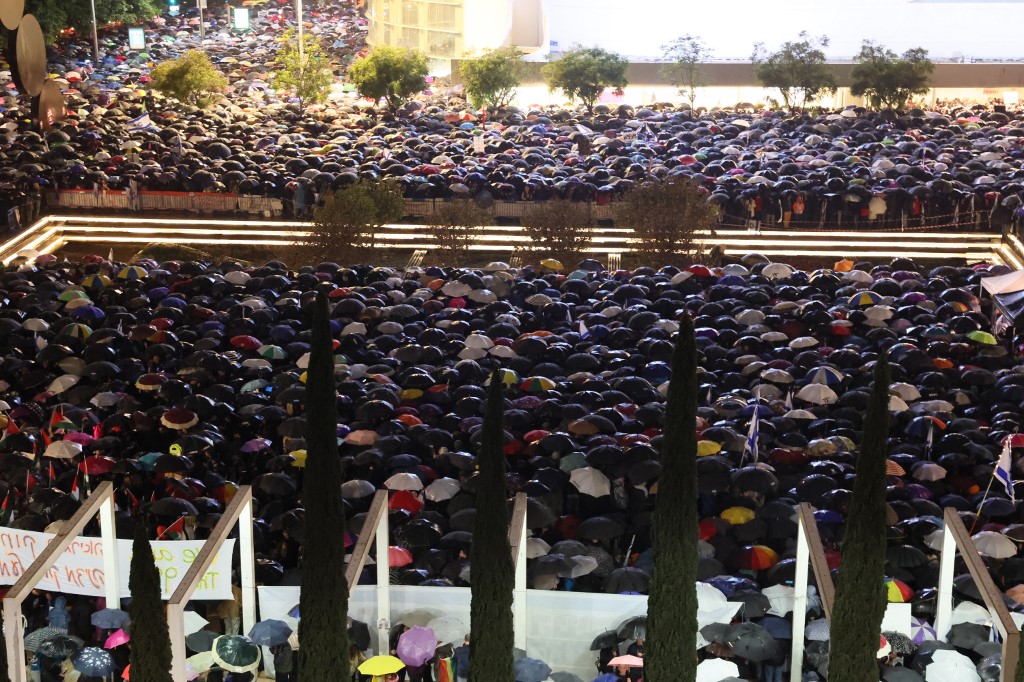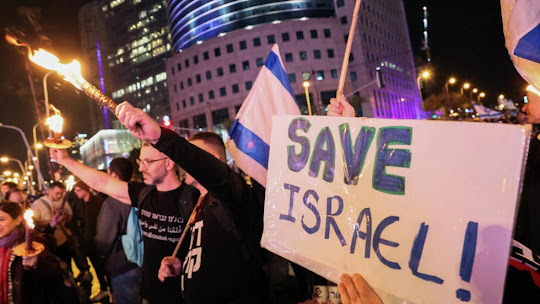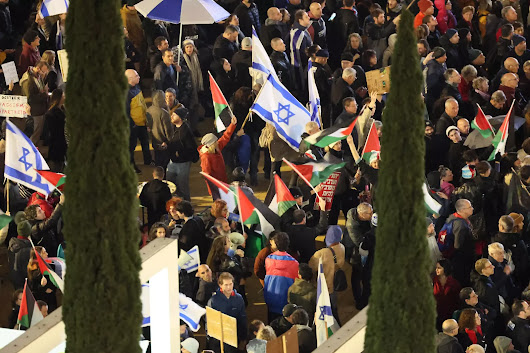Around 80,000 protesters take to the streets despite wet and rainy conditions to protest Prime Minister Benjamin Netanyahu's ultra-right government
Israeli protesters attend a rally against Prime Minister Benjamin Netanyahu's new hard-right government in the coastal city of Tel Aviv on 14 January (Reuters)
Published date: 14 January 2023
Tens of thousands of Israelis took to the streets in central Tel Aviv on Saturday to protest Prime Minister Benjamin Netanyahu's new far-right coalition government.
Police in Tel Aviv said around 80,000 protesters had gathered at and around Habima square. Protests were also taking place in Jerusalem, Haifa and other cities, as centre and left-wing parties, including the Hadash-Taal alliance - a joint list of two Arab-majority political parties - called on Israelis to reject new government policies.

Israel's judicial reforms will 'destroy' legal independence say top officialsRead More »
The demonstrations were organised under the call of "saving democracy", in criticism of some hardline stances the ultra-conservative government has adopted, including planned reforms to the country's justice system.
A main concern of opposition groups is a recently-proposed reform that would allow parliament to override decisions made by the Supreme Court. Analysts have warned that such a programme could potentially allow lawmakers to uphold any annulment of the corruption charges Netanyahu is being tried on.
An open letter published on Thursday by 11 former prosecutors said the reforms threaten to destroy Israel's judiciary.
Retired Supreme Court President Ayala Procaccia addressed those on the streets of Tel Aviv on Saturday, warning that "a country in which judges go out to protest is a country where all lines were crossed", Haaretz reported.
'Fascists in the Knesset'
Itai Niger, a 37-year-old from Tel Aviv, told Middle East Eye that he had attended the protest because he hoped to help send a message against "the regime and fascism".
'This government is really dangerous and has the potential to change things
for the worse' - Itai Niger, 37, protester
"I can’t stay at home and do nothing anymore," Niger said. "I decided to take part against what is happening now because this government is really dangerous and has the potential to change things for the worse in terms of rights.
In Israel, there is already a big problem of inequality, and there will be more abuse of power and corruption now. If there is a way to stand against that, then I will be there."
"I really, really hope that this marks some kind of awakening in this country," he continued.
In addition to court reforms, opposition protesters rallied against the new government's intentions to pursue a policy of settlement expansion in the occupied West Bank and social reforms that have worried members and supporters of the LGBTQ+ community.
Signs written in Hebrew and Arabic held up by the demonstrators gathered in Habima Square on Saturday reflected the diversity of demands: "The time has come to bring down the dictator"; "government of shame"; "There is no democracy with the occupation "; "Bibi does not want democracy, we do not need fascists in the Knesset"; "Iran is here"; and "You will love the other as yourself".
Rain started early Saturday evening, raising worries that the weather could affect attendance, but opposition leaders called on protesters to come out despite the wet conditions.
"Everyone should take an Israel flag in one hand, an umbrella in the second and come to defend democracy and the law in Israel," former Defence Minister Benny Gantz said on Twitter on Saturday ahead of his arrival at Habima square.
Many did just that, as images show blocks of demonstrators carrying overlapping umbrellas, creating a cover that obscured the people huddled beneath them.

Netanyahu is the first sitting Israeli prime minister indicted while in office. He denies the charges against him of bribery, fraud and breach of trust. He took office late last month following his 1 November election win, heading a coalition that includes a politician who last year admitted tax evasion and a clutch of far-right personalities, including one who once kept a portrait in his home of a man who massacred scores of Palestinian worshippers.
Last week, the new national security minister, Itamar Ben-Gvir, ordered the state's police commissioner to enforce a directive to remove Palestinian flags from public spaces a day after one was waved at a previous anti-government protest in Tel Aviv.
Despite the order, several Palestinian flags were spotted during Saturday's demonstration in the coastal city.

1 of 5
TEL AVIV, Israel (AP) — Tens of thousands of Israelis gathered in central Tel Aviv on Saturday night to protest plans by Prime Minister Benjamin Netanyahu’s new government to overhaul the legal system and weaken the Supreme Court — a step that critics say will destroy the country’s democratic system of checks and balances.
The protest presented an early challenge to Netanyahu and his ultranationalist national security minister, Itamar Ben-Gvir, who has ordered police to take tough action if protesters block roads or display Palestinian flags.
Israeli media, citing police, said the crowd at Tel Aviv’s Habima Square swelled to at least 80,000 people, despite cool, rainy weather. Protesters, many covered by umbrellas, held Israeli flags and signs saying “Criminal Government,” “The End of Democracy” and other slogans.
“They are trying to destroy the checks and balances of the Israeli democracy. This will not work,” said Asaf Steinberg, a protester from the Tel Aviv suburb of Herzliya. “And we will fight until the very last minute to save the Israeli democracy.”
No major unrest was reported, though Israeli media said small crowds scuffled with police as they tried to block a Tel Aviv highway.
Netanyahu, who is on trial for corruption charges, has made overhauling the country’s legal system a centerpiece of his agenda.
In office for just over two weeks, his government, which is comprised by ultra-Orthodox and far-right nationalist parties, has launched proposals to weaken the Supreme Court by giving parliament the power to overturn court decisions with a simple majority vote. It also wants to give parliament control over the appointment of judges and reduce the independence of legal advisers.
Netanyahu’s justice minister says unelected judges have too much power. But opponents to the plans say the proposed changes will rob the judiciary of its independence and undermine Israeli democracy. Israeli opposition leaders, former attorney generals and the president of Israel’s Supreme Court have all spoken out against the plan.
The legal changes could help Netanyahu, who is on trial for corruption, evade conviction, or even make his trial disappear entirely. Since being indicted in 2019, Netanyahu has said the justice system is biased against him.
Police beefed up their presence ahead of the march. Israeli media quoted police as saying officers had been instructed to be “very sensitive” and allow the protest to proceed peacefully. But they also vowed a tough response to any vandalism or violent behavior.
Smaller protests also took place in the cities of Jerusalem and Haifa.
Issued on: 14/01/2023
Tel Aviv (AFP) – Tens of thousands of people protested in central Tel Aviv Saturday against Prime Minister Benjamin Netanyahu's new hard-right government, which critics say threatens Israeli democracy.
Protesters braved the rain for the rally, brandishing signs with slogans decrying a "government of shame" and urging: "bring down the dictator", AFP correspondents said.
Israeli media reported 80,000 people joined the rally, citing police sources. Police gave no official estimate after reporting 20,000 protesters earlier in the evening.
The demonstration is the biggest since Netanyahu's new government took power in late December in Israel, a country of just over nine million.
"The situation is worrying and scary," said 22-year-old protester Aya Tal, who works in the high-tech industry.
"They want to take away our rights... We must unite."
Other rallies were held in Jerusalem, outside the prime minister's and the president's residences, and in the northern city of Haifa, local media reported.
Already Israel's longest-serving premier, Netanyahu returned to power at the head of a coalition with extreme-right and ultra-Orthodox Jewish parties, some of whose officials now head key ministries.
Protesters called for Netanyahu, who is fighting corruption charges in court, to resign.
"Bibi (Netanyahu) doesn't want a democracy, we don't need fascists in the Knesset," read one sign at the Tel Aviv protest, referring to the Israeli parliament.
'Save democracy'
Opposition parties had called on Israelis to join the demonstration -- organised by an anti-corruption group -- to "save democracy" and in protest at a planned judicial overhaul.

Netanyahu's return to power ended an unprecedented period of political gridlock that forced five elections in less than four years and deepened social divisions
Justice Minister Yariv Levin announced on January 4 a controversial plan to hand more powers to lawmakers in appointing judges and overriding Supreme Court decisions.
In Israel, which does not have a constitution, the Supreme Court currently has the authority to repeal laws it considers discriminatory.
Former Supreme Court judge Ayala Procaccia told the crowd the Israeli public "will not accept... the destruction of the basic values of our system."
"We are at a fateful moment for the future of Israel," she said.
The new government has also announced intentions to pursue a policy of settlement expansion in the occupied West Bank and carry out social reforms that have worried members and supporters of the LGBTQ community.
The rally included messages against the Israeli occupation of the Palestinian territories and calls to protect the rights of the LGBTQ community.
"There's no democracy with the occupation," read one sign.
Netanyahu is the first sitting Israeli prime minister indicted while in office. He denies the charges against him of bribery, fraud and breach of trust.
The leader of right-wing party Likud was ousted from office in 2021 after a record 12-year run by a motley coalition of parties, elected on the heels of anti-corruption protests that called for Netanyahu's resignation.
His return to power ended an unprecedented period of political gridlock that forced five elections in less than four years and deepened social divisions.
The leader of centre-left opposition party Labor, Merav Michaeli, was among several politicians at the Tel Aviv rally, as was former foreign minister Tzipi Livni.
Former defence minister Benny Gantz, now in the opposition, shared on Twitter a video of himself at the demonstration.
"We'll fight in the Knesset, we'll fight in the media, we'll fight on the streets", Gantz told protesters.
"We will make sure the democratic foundation of Israel is being preserved," he said. "We fight for the country's future together."
© 2023 AFP
By Al Mayadeen English
Source: Agencies
14 Jan 23
Thousands of Israeli settlers take to the street to denounce the newest Israeli occupation government and call for the ousting of PM Netanyahu.
Some 20,000 Israelis took to the streets of "Tel Aviv" on Saturday to protest Prime Minister Benjamin Netanyahu's cabinet, which has been criticized various times as being the most far-right government in Israeli history.
Protestors carried signs with slogans condemning the government and calling it a "government of shame", calling for "bring[ing] down the dictator", AFP reported.
The Israeli occupation forces estimated that some 20,000 protesters were on the street, with the organizers claiming there were "several tens of thousands" of protesters.
The demonstration is the biggest since the premier took office, with other rallies taking place in front of his residence in occupied Al-Quds and others in Haifa.
This is Netanyahu's sixth term after he was ousted from power in June last year, ending his 12-year run as prime minister, making him the longest-running premier since the start of the Israeli occupation of Palestine.
With Netanyahu coming back in, his third reign of terror will begin after having served as PM from 1996 to 1999 and from 2009 to 2021. This is his most controversial government to date, expected to lead to a Third Palestinian Intifada.
The demonstrators repeated chants against the new Israeli occupation government and some of its extremist ministers such as Police Minister Itamar Ben-Gvir and Finance Minister Betzalel Smotrich.
Following his November 1 election win, Netanyahu took office late last month at the head of a coalition with extreme-right and Zionist parties, some of whose officials now head key ministries. The new occupation government has announced intentions to pursue a policy of settlement expansion in the occupied West Bank.
"Bibi (Netanyahu) doesn't want a democracy, we don't need fascists in the Knesset," one sign read at a protest in "Tel Aviv".
Meanwhile, opposition parties called on Israelis to join the demonstrations to "save democracy" and protest Netanyahu's planned overhaul of the judiciary authority.
This comes after Israeli occupation Justice Minister Yariv Levin announced earlier in the month a controversial plan to hand more powers to lawmakers in appointing judges and overriding Supreme Court decisions.
Illustrating the increasingly stark division between Israelis, the president of Israeli occupation’s Supreme Court Esther Hayut lashed out on Thursday at the "judicial reform plan" proposed by Netanyahu's cabinet, stressing that it "would crush the justice system."
Hayet begins her speech at a conference of the Israeli Association of Public Law, likely the harshest speech ever delivered by a serving Supreme Court president against a ruling coalition, by noting that "a few days ago, the new justice minister presented a lightning plan for far-reaching changes in the justice system."
"In practice," she charges, "it amounts to an unrestrained attack on the justice system, as though it was an enemy that had to be rushed and defeated."
"With great cynicism, the architects of the plan call it a plan to correct the judicial system.’ And I say, it is a plan to crush the judicial system. It is intended to deliver a fatal blow to the independence and autonomy of the judicial system and silence it" she added.
The rally also included pro-Palestinian slogans, with one sign reading: "There's no democracy with the occupation."
Check out: New Netanyahu Government: Different shades of occupation
Political divisions in "Israel" between the government and the opposition are escalating in light of the exchange of accusations of responsibility for the possible outbreak of an "internal war".
This comes shortly after leaders within the Israeli occupation spoke about the ongoing division in "Israel" exposed by the results of the latest legislative elections.
Israeli occupation President Isaac Herzog said during a speech on the 27th anniversary of the killing of former Israeli occupation Prime Minister Yitzhak Rabin that "the complicated political status quo in Israel poses somewhat of a historic challenge for us."
Meanwhile, former Israeli occupation Security Minister Benny Gantz called on Sunday Israelis to take to the streets in protest of changes to the Israeli judicial system that Netanyahu's cabinet proposed.
My Flag My Identity
The new Israeli government is escalating its terror against Palestinians, the latest of which is the new Police Minister Ben-Gvir banning the raising of the Palestinian flag in public places, claiming that waving the Palestinian flag is an "act of terror". In addition, Ben-Gvir is in charge of the Israeli prison system, and he has plans to make things even worse for Palestinian prisoners, who already endure physical and psychological torture.




.jpg)

